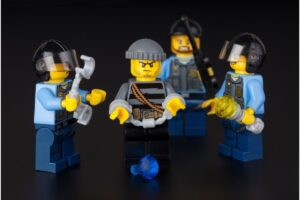One of the most heart-breaking moments any parent could face is learning that their child was charged with a crime and is currently sitting in a juvenile detention facility in El Paso County. As a parent, you’ll do almost anything to protect a child facing criminal charges and lessen the long-term consequences that may result from a momentary lack of judgment.
The commitment to your child’s well-being and safety is tested in various ways as they grow from babies to toddlers to grade-schoolers to teenagers. But if you get a call from your teen or from a police officer telling you that they have been arrested and charged with a juvenile crime in Colorado Springs, your commitment will be tested more than ever before.
Being arrested can be a frightening ordeal for anyone, regardless of age. But for a vulnerable child or teen caught up in the criminal justice system, the experience is even more so. Your child will be looking to their parent, their protector, to reassure them that everything will be okay. They will be relying on you for guidance as to what to do.
Do you know what to say to your child in this circumstance? Do you know what steps you need to take as a parent to keep this already difficult situation from getting worse? Keep reading.
Call A Juvenile Crimes Defense Attorney Immediately
Of all the decisions your child will be relying on you to make, perhaps none is more important than hiring a juvenile defense attorney to represent them. While there are essential differences between Colorado’s juvenile justice system and the adult criminal justice system, the need for experienced, strategic, and aggressive defense counsel remains the same.
From the first moment your child starts interacting with law enforcement, their rights are at risk. The fear and uncertainty they feel can lead them to say or do things that can hurt their chances of emerging from the ordeal unscathed.
Ensure the Colorado Springs criminal defense law firm you hire handles juvenile crimes cases regularly. The rules and strategies involved in defending juvenile cases and minimizing the consequences require specific knowledge of how prosecutors handle such cases and how to move the case towards the best possible outcome for your child.
Related: Why Former Prosecutors Are The Best Criminal Defense Attorneys
Remind Your Child That Silence is Golden
No matter how young your child is, they have the constitutional right to remain silent. But having that right means very little if your child is unaware of it.
 Even if they know that they are not obligated to speak to the police, your child can be easily intimidated into talking. After all, they are not only facing criminal charges but also your anticipated anger and disappointment. And if you have raised them to respect authority, they will understandably want to tell the police their side of the story (or try to talk their way out of the situation.
Even if they know that they are not obligated to speak to the police, your child can be easily intimidated into talking. After all, they are not only facing criminal charges but also your anticipated anger and disappointment. And if you have raised them to respect authority, they will understandably want to tell the police their side of the story (or try to talk their way out of the situation.
Colorado Springs police receive special training to encourage those accused of a crime to talk. This training is not a result of altruism; they are not hoping to ease the conscience of the accused by confession, nor is it out of a desire to help them. They want the accused to make admissions that admit guilt.
Tell your child to respectfully and politely advise the police that they will not speak any further or answer any questions until the lawyer you have obtained for them is present.
There Is No Such Thing As Parent-Child Privilege
Of course, you want your child to tell you what happened. You want to know what they have to say. But any discussions regarding the facts and circumstances of the incident that led to the charges filed against them could be admissible as evidence in a court of law.
You can be called as a witness to testify as to what your child said. There is no parent-child privilege. However, your child’s discussions with their defense lawyer fall under attorney-client privilege. If your child has things to say about the case, they should tell them to their lawyer.
Seek Treatment Options
Many kids and teens face juvenile charges due to a momentary lapse in judgment or because they lack the experience to know that actions have consequences. Kids will be kids. However, for others, an arrest can be a symptom of more significant issues, be it substance abuse, mental illness, bullying, or physical abuse. As unfortunate as the current circumstances may be, use this ordeal as an opportunity to discover and take action on any underlying issues. Not only are you showing love and support to your child, but you are also aiding their attorney to put up the very best defense for the crimes your child was charged with committing.
Provide Love and Support
As noted above, your commitment to love and support your child is truly being put to the test when they are charged with a crime. Once the heartbreak and fear for your child subside, you will likely experience disappointment and even anger over the actions that led to their arrest.
But at the end of the day, continue doing what you have been doing their whole lives – putting their needs ahead of your own. Your child will need you to simply be their parent. Give them the love and support that will allow them to learn from their mistakes and help them understand that everything will ultimately be okay.
Practical Steps If Your Child Was Charged With A Crime
You need to take practical steps to protect your child after they’ve been arrested; retaining an experienced and tenacious juvenile crimes defense attorney and bringing your child home are first among those steps.
If your child was charged with a crime iCops and robbers is no longer a game if your child was charged with a crime in real life. How can you keep a bad situation from getting worse?n Colorado Springs, don’t wait. Speak to a juvenile defense attorney today.


